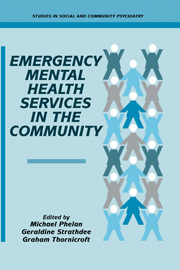Book contents
- Frontmatter
- Contents
- Contributors
- Foreword
- PRINCIPLES AND POLICIES
- 1 The scope and limitations of emergency mental health services in the community
- 2 Service models in emergency psychiatry: an international review
- 3 Users' perspective on emergency needs
- 4 Legal aspects of mental health emergencise
- 5 The economics of mental health emergency services
- 6 Suicide prevention
- 7 Using the crisis
- 8 Community assessment of crisis
- CHALLENGE OF IMPLEMENTATION
- Index
8 - Community assessment of crisis
from PRINCIPLES AND POLICIES
Published online by Cambridge University Press: 28 October 2009
- Frontmatter
- Contents
- Contributors
- Foreword
- PRINCIPLES AND POLICIES
- 1 The scope and limitations of emergency mental health services in the community
- 2 Service models in emergency psychiatry: an international review
- 3 Users' perspective on emergency needs
- 4 Legal aspects of mental health emergencise
- 5 The economics of mental health emergency services
- 6 Suicide prevention
- 7 Using the crisis
- 8 Community assessment of crisis
- CHALLENGE OF IMPLEMENTATION
- Index
Summary
Introduction
In Britain, crisis assessments have traditionally either been provided by a consultant carrying out a domiciliary visit in the patient's home or by a psychiatric trainee in the hospital setting. With the growth of community mental health services other options are now available. In this chapter the effects of a change from a unidisciplinary medical assessment to multidisciplinary assessments, and the change of setting from hospital to community are briefly discussed. The remainder of this chapter considers those aspects of a crisis assessment that are particularly relevant or altered by the change to a community setting, and the often conflicting ethical principles encountered in the practice of community psychiatry.
Multidisciplinary assessments compared to a unidisciplinary medical assessment
In the traditional hospital based service the consultant domiciliary visit was generally the only form of community outreach available. Although originally intended as a joint visit between consultant and general practitioner (GP), such joint visits now rarely occur (Littlejohns, 1986; Donaldson & Hill, 1991). Consultant domiciliary visits (DVs) are most commonly requested in the specialities of psychiatry and geriatrics (Smith & Blythe, 1971), and requests for psychiatric DVs have increased by two-thirds over the past 20 years (Sutherby, K., Strathdee, G. & Macdonald, A. J. D. Domiciliary visits in the South East Thames Region: twenty years of change. Unpublished research report, 1994).
- Type
- Chapter
- Information
- Emergency Mental Health Services in the Community , pp. 149 - 174Publisher: Cambridge University PressPrint publication year: 1995
- 1
- Cited by

